
11 minute read
2020 voter guide
Text by ANTONIA MOU and ISHANI RAHA Art by SELENA CAO VOTE YOUR FUTURE
A GUIDE TO GRASP THIS FALL'S LOCAL BALLOT
AS THIS NOVEMBER'S ELECTION draws nearer, the overwhelming number of issues and candidates on the ballot can be anxiety-inducing for first-time high school voters and seasoned voters alike. In this guide, Verde Magazine has compiled short biographies on the 10 candidates vying for four open spots on the Palo Alto City Council, and the six candidates battling it out for three seats on the Palo Alto Board of Education. The three measures covered in this voter guide will require a two-thirds majority vote to pass. v
CITY COUNCIL
AJIT VARMA: Product management director, parent
A Palo Alto resident since 1999, Varma has lived through the tech boom and worked for prominent companies like Square, Google and Facebook. One of Varma’s top priorities is to reduce the spread of COVID-19 through rapid testing, improved contact tracing, rules for social distancing and protective equipment, and vaccine distribution. Other main focuses for Varma include helping small businesses recover from the pandemic and maintaining job and business opportunities in Palo Alto. Varma hopes to achieve this without bureaucratic barriers like office space caps, slow approval processes like zoning changes, as well as head taxes and annual fees. CARI TEMPLETON: Planning & Transportation Commission Chair
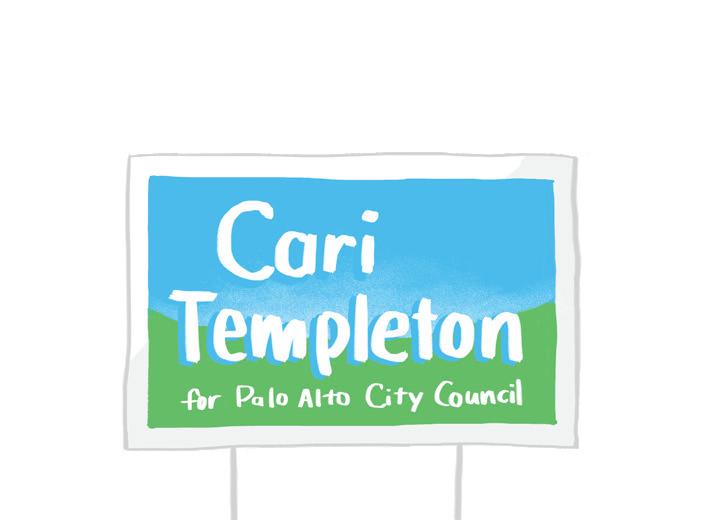
Templeton, a former program manager at Google, has set her sights on three main priorities as a candidate: community wellness through the pandemic, climate action with housing and transportation plans, and modernizing Palo Alto’s infrastructure and public safety programs. She hopes to increase free COVID-19 testing and protective equipment, provide housing stability for residents and financial support for businesses, as well as expand programs for mental health during the pandemic. Templeton is advocating for farefree public transportation for students and seniors, as well as reduction of urban sprawling by building housing near transit.
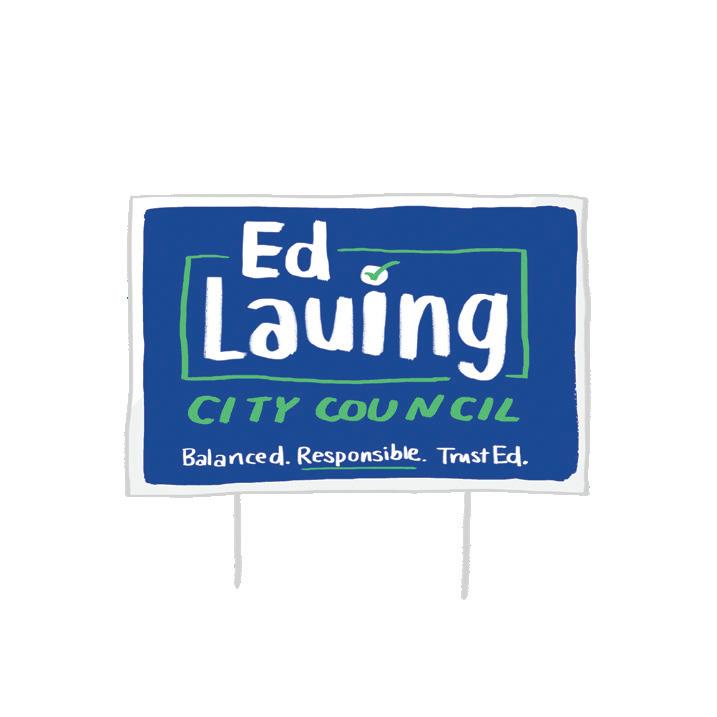
In his 33 years of living in Palo Alto, Lauing served on city commissions for 10 of those years. Lauing’s priorities include increasing the number of homes being built and providing low- and middle-income citizens a place to live by evaluating the funding for below-market rate homes. In addition, he hopes to revise and reform safety services, especially the Palo Alto Police Department, in light of the nation’s racial crisis. He also emphasizes a budget that prioritizes public safety, essential services and amenities, including implementing parking programs in neighborhoods and affordable pricing for parking lots and garages. GREER STONE: Chair of SCC Justice Review Committee
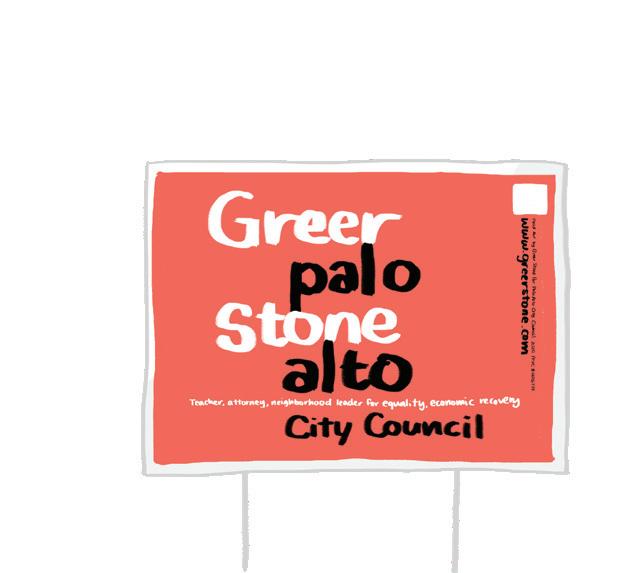
As a former attorney and a member of various human rights commissions, Stone is a longtime advocate for social justice. One of Stone’s main priorities as a candidate is to bolster economic recovery in response to the pandemic. He hopes to increase affordable housing by rebalancing the jobs to housing ratio and targeting zoning incentives for projects that create more than the minimum mandated affordable units. The current Paly student activities director is also focused on reducing traffic in Palo Alto to create a more environmentally sustainable city and promotes telecommuting — working from home — beyond the COVID-19 pandemic.
GREG TANAKA: Incumbent, Tech founder & CEO
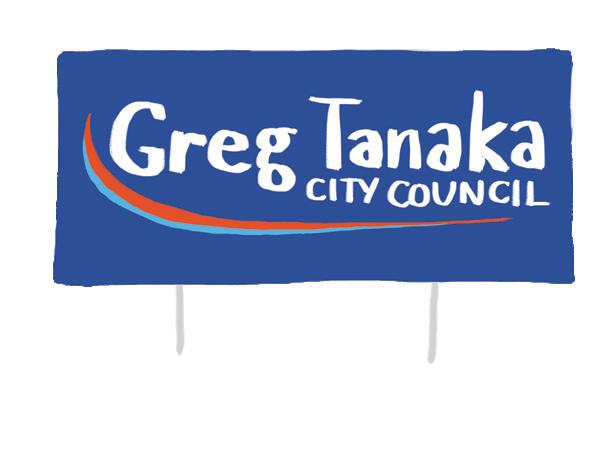
Tanaka is seeking reelection with a platform of strong fiscal responsibility, which he champions as especially critical with the COVID-19 economic crisis. He hopes to focus the city budget on community services facing cuts, such as city libraries and parks. As the former City Council Finance Committee Chair, Tanaka advocated for eliminating excessive spending on staff raises and city manager expenses, and worked to minimize city tax and fee increases. He also emphasizes providing financial support to local businesses amid the pandemic.
PAT BURT: Former mayor, Retired CEO
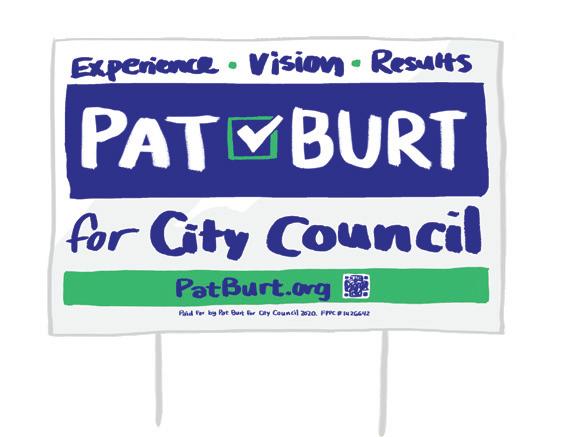
The former two-term council member and planning commissioner is focused on restructuring the city budget to direct more money to public safety, youth, family and senior services, and programs for marginalized community members. Additionally, one of Burt’s top priorities as an environmental leader is to make Palo Alto a model of climate protection with low-cost, 100% clean energy. In the past, he has led the city’s efforts on emergency preparedness and flood protection. He supports taxing big businesses and developers for traffic relief and transit funds.
REBECCA EISENBERG: Attorney, district parent
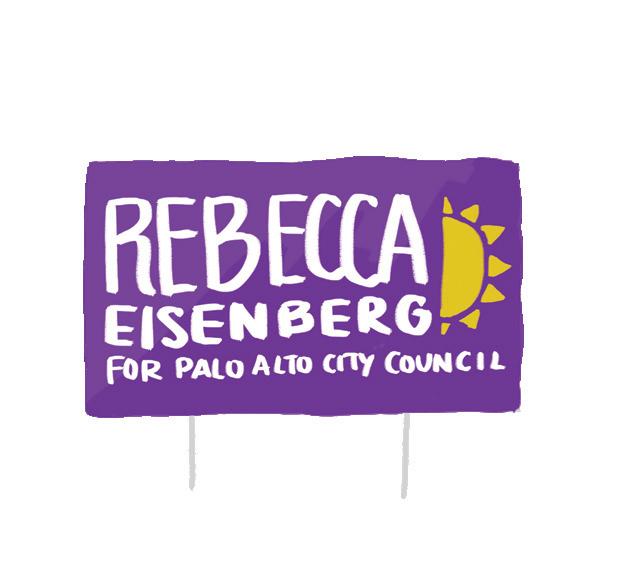
From attending Stanford University to reporting for Bay Area publications on the latest business and technology trends, Eisenberg has deep ties in Palo Alto. If elected, Eisenberg would shift tax burdens from residents to corporations through business taxes and end reliance on parcel taxes to fund schools. Additionally, she supports opening Foothills Park to nonresidents, as well as defunding the police force. She highlights the need to push for environmental sustainability through protected bike lanes and electric shuttles. LYDIA KOU: Incumbent, Realtor, Small business owner
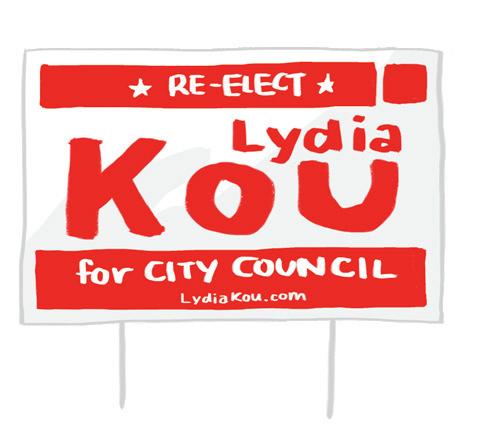
A former member of the Palo Alto Neighborhoods Emergency Preparedness Committee, Kou is no stranger to city initiatives and politics. Her main priority is to slow the rate of city growth, as she believes in preserving existing housing rather than building more. As part of the Council’s slow growth bloc, Kou hopes to update employee density codes as the number of employees increases. She also emphasizes protecting community-serving businesses and encouraging financial stability as a community, as well as prioritizing transportation demand management.
RAVEN MALONE: Activist, Systems engineer
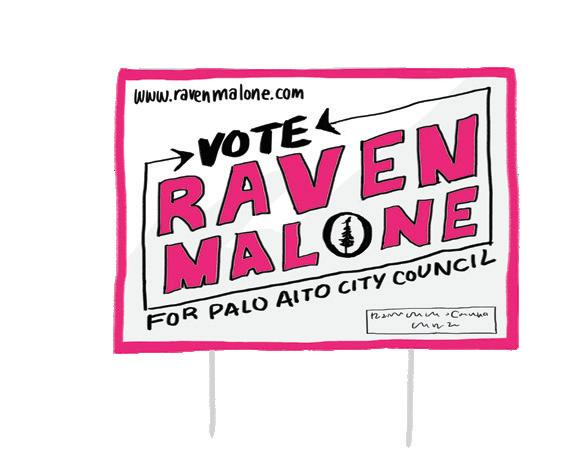
Malone, a Palo Alto newcomer and social justice activist, has been involved in the local Black Lives Matter movement by organizing protests and calling for holistic emergency responses in a community-led approach to public safety. Malone’s priorities are to end exclusionary zoning, increase affordable and safe housing, and invest in community resources. In her plan to create sustainable infrastructure, Malone has proposed city-wide fiber optic connections, protected bike lanes, better shuttles and flood protection — a callback to her time assisting Hurricane Harvey relief efforts.
STEVEN LEE: Human Relations Commissioner, Attorney
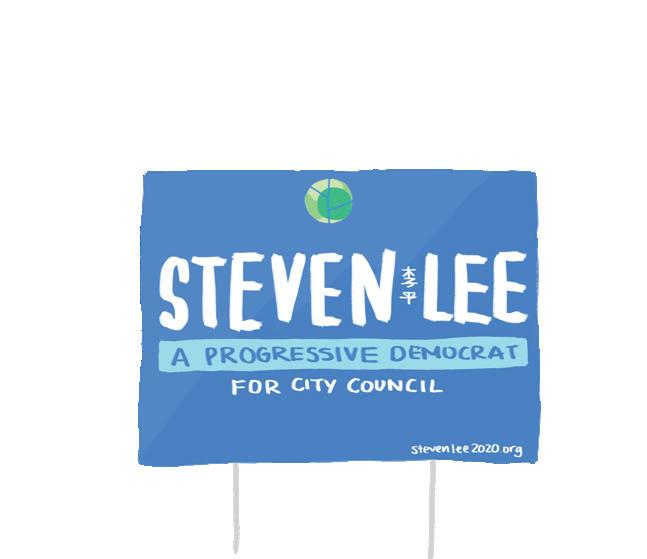
“It’s time for bold, progressive and responsive leadership.” Lee’s campaign slogan reflects his aggressive pushes for social change in Palo Alto. One of the most vocal critics of the PAPD in the HRC, Lee believes that the 8 Can’t Wait policies are a bare minimum to police reform and supports a citizen’s oversight committee for the PAPD. Additionally, Lee has expressed the importance of implementing a Palo Alto Green New Deal and providing incentives for residents, students and workers to adapt to sustainable transportation.
KATIE CAUSEY: Community advocate, Nonprofit fundraiser
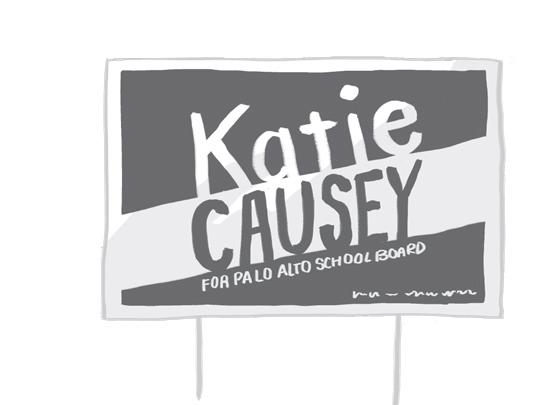
Causey, a PAUSD alumna, is focused on the wellbeing of students during and after the pandemic above all else. Amid COVID-19, Causey hopes to adapt CDC principles on trauma-informed approaches to education and collaborate with public health professionals about decisions in the district. She also emphasizes the urgency of developing an annual District Equity Scorecard to expand upon the PAUSD Promise to help close the opportunity gap for historically underrepresented students, and wants to implement a PAUSD alumni network.

As an incumbent, for the past four years, DiBrienza has worked towards creating a Title IX office and increasing education for students and staff about consent. She plans to continue advocating for an alignment in workload, assessments and grading practices across courses, and remains a strong voice for educational justice and addressing systemic racism. DiBrienza’s unique position as a former teacher and current district parent allows her to empathize with many community members, whether it be teachers, parents or administrators.
MATT NAGLE: Former PAUSD Principal, district parent

Former PAUSD principal Nagle is running on a platform of educational equity, focusing on the academic success of Latino, Black, low-income and Special Education students throughout the pandemic. He is also a big proponent of anti-racist training for board members, administrators and teachers. Uniquely, Nagle is not asking for campaign donations –– just your vote –– and is directing potential donors to three organizations: East Palo Alto Tennis & Tutoring program, Dolores Huerta Foundation and Daraja Academy for Girls. TODD COLLINS: Incumbent, former district parent

As the school board president, Collins has taken action on pressing issues such as identifying the negative impact of the Stanford General Use Permit on the district’s finances. One of Collins’ top priorities is strengthening trust between parents, teachers and the community by following through on commitments. He also emphasizes looking at kids as individuals to close the achievement gap for low-income and minority students and would like to focus on strong fiscal management by cutting expenses and protecting key programs.
JESSE LADOMIRAK: Small business owner, district parent

Ladomirak, a PAUSD alumna, hopes to use her two decades of fiscal experience running a small business to ensure that PAUSD’s expenditures reflect its stated priorities through principled budgeting. She also prioritizes wellness through creating a school environment that nurtures the social-emotional well-being of all students. Ladomirak aims to increase interpersonal connection in the midst of COVID-19 through regular, ongoing outreach to all students. She wants to invest in equity audit tools and data analysis to identify areas of inequity.
KARNA NISEWANER: Attorney, district parent

Nisewaner intends to use her experience in management and creative thinking from her 20 years of being a lawyer to boost educational outcomes for all students in the district. As Chair of Palo Alto Community Childcare, Nisewaner took on financial planning while balancing the care for children, teacher recruitment and economic sustainability. Additionally, as a mother of two Addison Elementary School students, she believes that communicating transparently and building trust with parents should be one of the Board’s top priorities.
MEASURE O: PAUSD PARCEL TAX
Measure O will renew a parcel tax for Palo Alto schools, beginning July l and increasing annually by 2% for six years. According to the Measure, the parcel tax will raise approximately $16 million per year with citizens taxed $836 per parcel.
In favor
Proponents say funding will attract and retain qualified teachers, support technology for distance learning and preserve the quality of math, science, reading, writing, arts and music programs. Additionally, the parcel tax would add support staff to help at-risk students, maintain teaching specialists and help keep class sizes small.
In favor
Supporters say funding would save Caltrain from shutdown and preserve the service for thousands of essential workers. Additionally, money generated by the tax would provide roughly $60–70 million per year for Caltrain to develop infrastructure that will reduce traffic congestion. It would also allow Caltrain to invest in cleaner and quieter electric trains and increase train frequency and capacity.
In favor
Supporters claim that the measure does not add a new tax and simply renews an old tax, meaning that there is no new tax burden to citizens. Measure S also works to help the environment, which includes creek restoration, shoreline protection, environmental cleanup and habitat restoration.
Rebuttal
Those against this measure claim that significant taxpayer money can be saved by decreasing school funding due to school closures caused by COVID-19. Many are also concerned that California is already under a large tax burden, and funding schools that likely won’t open soon is not a
MEASURE RR: CALTRAIN FUNDING
If passed with a two-thirds majority vote across Santa Clara, San Mateo and San Francisco counties, Measure RR would levy a 30-year one-eighth cent sales tax, raising approximately $100 million annually for the Caltrain service.
priority when spending taxpayer money.
Rebuttal
Opponents are concerned that Caltrain ridership will not recover after the pandemic due to a heightened risk of transmission. Also, even though a majority of Caltrain riders are higher income, the extra 30-year sales tax will be most detrimental for many low- and middle-income individuals, especially for those who are still recovering
MEASURE S: WATER DISTRICT TAX
Measure S is the renewal of a parcel tax to fund the Santa Clara Valley Water District’s Safe, Clean Water and Natural Flood Protection Program. The tax averages $0.006 per square foot annually and is estimated to raise $45.5 million every year.
from the financial burden of COVID-19.
Rebuttal
Opponents say that the pay-as-you-go system of funding has resulted in delays for the project, creating the need to borrow money and causing over $331 million in debt. Additionally, if passed, the parcel tax would have no sunset provision — no definitive end date — as opposed to the 15-year sunset on the 2012 parcel tax up for renewal.










